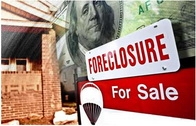Advertisement
FTC proposes rule to bar loan mod companies from charging upfront fees

The Federal Trade Commission (FTC) moved to protect distressed homeowners from the promoters of bogus foreclosure rescue and mortgage modification services by proposing a new rule that would forbid companies to charge upfront for these services. Instead, companies could only collect payment after providing services.
"Homeowners facing foreclosure or struggling to make mortgage payments shouldn't have to contend with fraudulent 'companies' that don't provide what they promise," FTC Chairman Jon Leibowitz said. "The proposed rule would outlaw upfront fees so companies can't take the money and run."
According to the Notice of Proposed Rulemaking, historic levels of consumer debt, increased unemployment, and an unprecedented downturn in the housing and mortgage markets have contributed to high rates of mortgage loan delinquency and foreclosure. The mortgage crisis has launched an industry of companies purporting, for a fee, to obtain mortgage loan modifications or other relief for consumers facing foreclosure. The FTC has brought 28 cases in this area, and state and federal law enforcement partners have brought hundreds more.
Generally these cases charged that companies do not provide the services they promise and that they misrepresent their affiliation with the government and government housing assistance programs, including the Making Home Affordable Program.
The FTC notice seeks public input, particularly from attorneys and other professionals, on a proposed rule that would require mortgage relief companies to make good on their promised results before charging or accepting payment from consumers. Under the proposed rule, companies could not be paid until they had a documented offer from a mortgage lender or servicer that lives up to the promises they have made.
"Far too many homeowners have paid up-front fees to bad actors who promised loan modifications but never delivered," Treasury Secretary Timothy Geithner said. "I commend the FTC for proposing a strong set of safeguards to protect consumers from these predatory practices."
The proposed rule also would bar providers from telling consumers to stop communicating with their lenders or mortgage servicers, and from misleading them about key facts such as:
►The likelihood of getting the results they want, and how long it will take.
►Their affiliation with public or private entities.
►Payment and other existing mortgage obligations.
►Refund and cancellation policies.
In addition, the proposed rule would require providers to tell consumers that they are for-profit businesses, the total amount consumers will have to pay, that neither the government nor the consumer's lender has approved their services, and that there is no guarantee that the lender will agree to change their loan.
For more information, visit www.ftc.gov.
About the author





